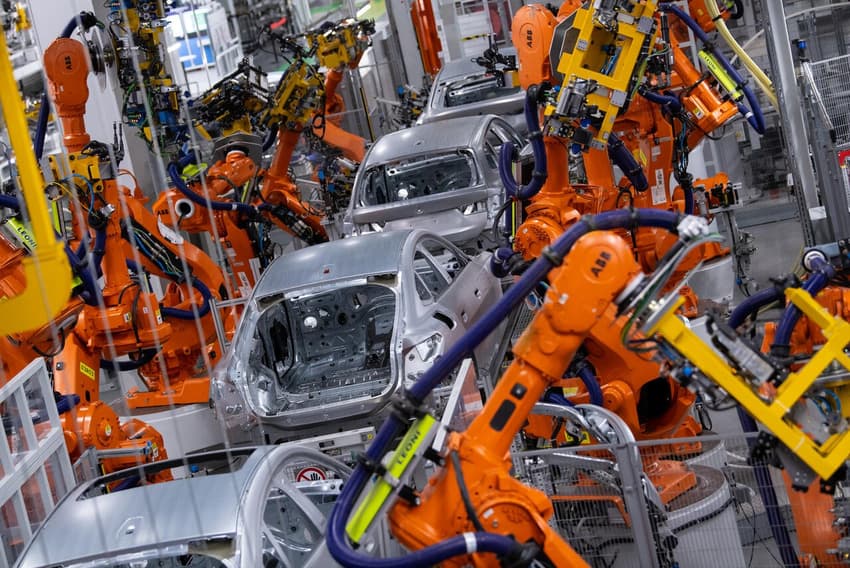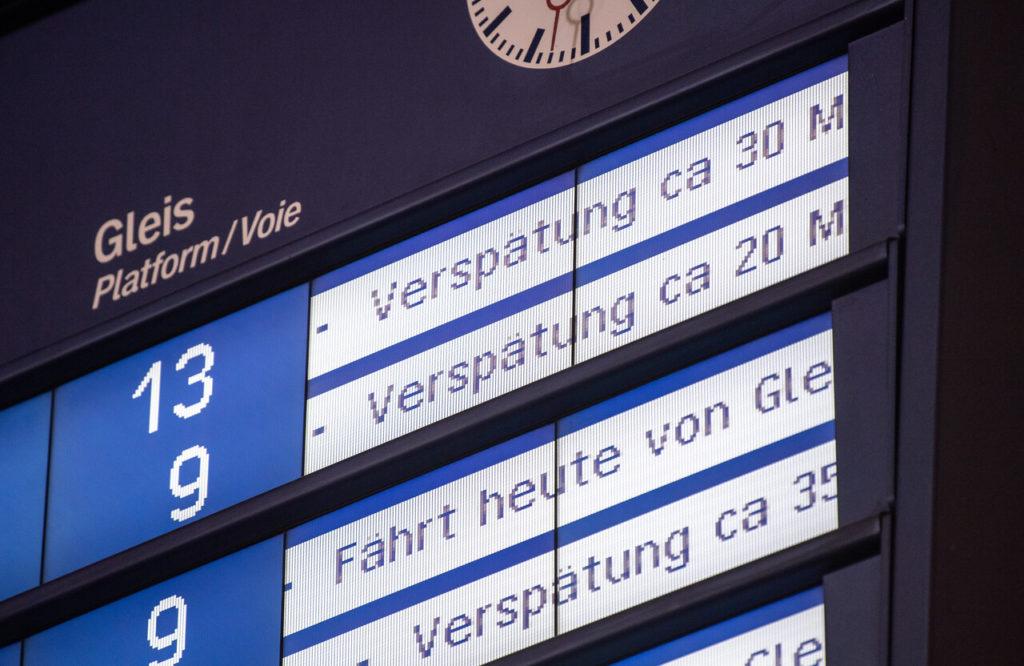INTERVIEW: Where does the myth of German efficiency come from?

Germany has a reputation around the world for efficiency. But those who live here often have a different experience. Historian and author James Hawes, shared where he thinks the efficiency myth comes from.
Whether it's being punctual, getting straight to the point or sticking to rules, there is certainly some truth in German stereotypes.
But many foreigners who make a life in the Bundesrepublik are often confused to find that the characteristic of German efficiency is not quite what it seems.
Although it's fair to say that a lot of things in Germany function, things don't always run smoothly.
That can be seen in the long-distance train service. Figures show that from January to November last year only 65.6 percent - just under two-thirds of long-distance trains arrived on time in Germany, and punctuality even dropped below 60 percent from July to August 2022.
In May this year, 65.5 percent long-distance trains arrived at their scheduled stops on time.
And then there are the bungled projects; the opening of Berlin's BER airport, for instance, was famously delayed by nine years.
READ ALSO:
- How one simple rule could help German trains arrive on time
- How the Covid-19 vaccine fiasco exposes the myth of German efficiency
When you live in Germany you get used to the various long-winded bureaucratic processes that can affect daily life as well as the general running of the country.
This is, of course, a country where fax machines are still used fairly regularly.
All of this can make it difficult to understand where the stereotype of German efficiency comes from and why it’s still strong today.

A display board at Stuttgart's main station shows delays for several train connections. Photo: picture alliance/dpa | Fabian Sommer
British historian and author of The Shortest History of Germany, James Hawes, told the Germany in Focus podcast in an interview that he believes the idea of Germany getting things done in an efficient manner dates back to the 1870s.
"I think we can date this pretty exactly," he said. "And the time point is the Franco-Prussian war."
PODCAST: The myth of German efficiency and Germany's most overlooked state
Hawes said that we can learn from the accounts of British tourists who used to flock to Germany before this war.
"It was kind of a standard itinerary of Thomas Cook's to go down the Rhine and do Cologne Cathedral, visit Bonn and so forth and see the Lorelai," he said. "But their accounts of Germany in the 1860s are dominated by that wonderful German word in translation - Schmamperei (sloppiness).
"They constantly talk about inefficiency, bureaucracy, about how they can't get their servants to be clean enough - there's no sign at all of this modern myth of German efficiency.
"But that comes around almost immediately in 1870-71. Because the British, like everyone else, are completely shocked at how the Prussian armies have just destroyed the French army so easily. The accounts in the Times (a British newspaper) and so forth of the Franco-Prussian war go on and on about this monstrous efficiency and inhuman skill of the Germans which is something that will be echoed then in HG Wells' War of the Worlds' a bit later on.
"It is then that this myth of the Germans as an incredibly organised and efficient country is quite suddenly created and it's Prussian, not German really."
Hawes says that the guild organisation of German society and many professions have added to the efficient reputation that the world sees.
"The truth is that Germany has an extremely long tradition of things like skilled metalwork - think of the clockmakers of Mainz in the Middle Ages or the armour makers of Solingen," he said. "I think the secret is that kind of 'Zoompft' organisation, the guild organisation of the way German firms still work to a large extent."
The historian said the Anglo-Saxon world forgets that "Germany is in fact extremely hierarchical in terms of work relationships".
"Your life as a German person is very much decided at a very early age if you go to Gymnasium (secondary school) or not, and then once you enter a profession far more hierarchical than the Anglo-Saxon equivalents," Hawes said.

Apprentices and students employed by thyssenkrupp Marine Systems (TKMS) in Wismar work with metal files in a training workshop. Photo: picture alliance/dpa | Jens Büttner
"Or if you become an engineer, a floor tiler, you will go through what is, to American and British, eyes an incredible period of training to get your 'master ticket' which is a formal thing."
Hawes said that this qualification system doesn't exist in the same way as in the US or UK.
READ ALSO: OPINION: Germany's unfair school system entrenches inequality
"It's more freewheeling," he said. "And that I think is at the heart of it. The myth of this German efficiency is a particularly English thing I suspect. I don't think that the French or Italian have the same obsession with it as we do."
Hawes said that in many ways - and especially when it comes to bureaucracy - "Germany is extraordinarily inefficient".
"It (efficiency) really is a myth," said Hawes, adding that Brits love to hype this stereotype up.
"So we kind of put Germany up as this incredibly efficient, almost alienly efficient culture when it's really nothing of the sort, it's just our own stupidity that we can't make decent cars and things," he said.
So is the myth starting to fade?
According to Hawes, things are changing.
Referencing the auto industry that Germany is famous for, Hawes said: "We know that the German car industry is coming under severe competition from China now.
"But I think that the idea that German cars, and maybe other German engineering products are uniquely reliable, uniquely technically perfect - that idea is probably done for and that will be a big blow to Germany's international myth."
Comments (1)
See Also
Whether it's being punctual, getting straight to the point or sticking to rules, there is certainly some truth in German stereotypes.
But many foreigners who make a life in the Bundesrepublik are often confused to find that the characteristic of German efficiency is not quite what it seems.
Although it's fair to say that a lot of things in Germany function, things don't always run smoothly.
That can be seen in the long-distance train service. Figures show that from January to November last year only 65.6 percent - just under two-thirds of long-distance trains arrived on time in Germany, and punctuality even dropped below 60 percent from July to August 2022.
In May this year, 65.5 percent long-distance trains arrived at their scheduled stops on time.
And then there are the bungled projects; the opening of Berlin's BER airport, for instance, was famously delayed by nine years.
READ ALSO:
- How one simple rule could help German trains arrive on time
- How the Covid-19 vaccine fiasco exposes the myth of German efficiency
When you live in Germany you get used to the various long-winded bureaucratic processes that can affect daily life as well as the general running of the country.
This is, of course, a country where fax machines are still used fairly regularly.
All of this can make it difficult to understand where the stereotype of German efficiency comes from and why it’s still strong today.

British historian and author of The Shortest History of Germany, James Hawes, told the Germany in Focus podcast in an interview that he believes the idea of Germany getting things done in an efficient manner dates back to the 1870s.
"I think we can date this pretty exactly," he said. "And the time point is the Franco-Prussian war."
PODCAST: The myth of German efficiency and Germany's most overlooked state
Hawes said that we can learn from the accounts of British tourists who used to flock to Germany before this war.
"It was kind of a standard itinerary of Thomas Cook's to go down the Rhine and do Cologne Cathedral, visit Bonn and so forth and see the Lorelai," he said. "But their accounts of Germany in the 1860s are dominated by that wonderful German word in translation - Schmamperei (sloppiness).
"They constantly talk about inefficiency, bureaucracy, about how they can't get their servants to be clean enough - there's no sign at all of this modern myth of German efficiency.
"But that comes around almost immediately in 1870-71. Because the British, like everyone else, are completely shocked at how the Prussian armies have just destroyed the French army so easily. The accounts in the Times (a British newspaper) and so forth of the Franco-Prussian war go on and on about this monstrous efficiency and inhuman skill of the Germans which is something that will be echoed then in HG Wells' War of the Worlds' a bit later on.
"It is then that this myth of the Germans as an incredibly organised and efficient country is quite suddenly created and it's Prussian, not German really."
Hawes says that the guild organisation of German society and many professions have added to the efficient reputation that the world sees.
"The truth is that Germany has an extremely long tradition of things like skilled metalwork - think of the clockmakers of Mainz in the Middle Ages or the armour makers of Solingen," he said. "I think the secret is that kind of 'Zoompft' organisation, the guild organisation of the way German firms still work to a large extent."
The historian said the Anglo-Saxon world forgets that "Germany is in fact extremely hierarchical in terms of work relationships".
"Your life as a German person is very much decided at a very early age if you go to Gymnasium (secondary school) or not, and then once you enter a profession far more hierarchical than the Anglo-Saxon equivalents," Hawes said.

"Or if you become an engineer, a floor tiler, you will go through what is, to American and British, eyes an incredible period of training to get your 'master ticket' which is a formal thing."
Hawes said that this qualification system doesn't exist in the same way as in the US or UK.
READ ALSO: OPINION: Germany's unfair school system entrenches inequality
"It's more freewheeling," he said. "And that I think is at the heart of it. The myth of this German efficiency is a particularly English thing I suspect. I don't think that the French or Italian have the same obsession with it as we do."
Hawes said that in many ways - and especially when it comes to bureaucracy - "Germany is extraordinarily inefficient".
"It (efficiency) really is a myth," said Hawes, adding that Brits love to hype this stereotype up.
"So we kind of put Germany up as this incredibly efficient, almost alienly efficient culture when it's really nothing of the sort, it's just our own stupidity that we can't make decent cars and things," he said.
So is the myth starting to fade?
According to Hawes, things are changing.
Referencing the auto industry that Germany is famous for, Hawes said: "We know that the German car industry is coming under severe competition from China now.
"But I think that the idea that German cars, and maybe other German engineering products are uniquely reliable, uniquely technically perfect - that idea is probably done for and that will be a big blow to Germany's international myth."
Join the conversation in our comments section below. Share your own views and experience and if you have a question or suggestion for our journalists then email us at [email protected].
Please keep comments civil, constructive and on topic – and make sure to read our terms of use before getting involved.
Please log in here to leave a comment.